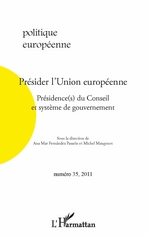The Institutionalization of the European Council Presidency : Institutional Dependence and Franco-German Inflections

Following its pragmatic emergence in the EU political landscape, the Presidency of the European Council was the most visible part of the rotating Presidency until the entry into force of the Lisbon Treaty. An in-depth analysis of this function shows its long dependency on the half-year exercise.
The Institutionalization of the Presidency of the European Council was primarily marked by two periods of inflection during which the behaviours of the actors, especially French and German leaders, have tailored a presidential role dissociated from the rotating presidency. The emergence of this supranational role has led to heightened tensions over questions of identity, due to its exercise by national leaders. Moreover, the secondary nature of its legal formalization as regards reflections and codifications by the actors themselves is clearly underlined by this institutional construction.
Related centers and programs
Discover our other research centers and programsFind out more
Discover all our analyses
Securing critical raw material (CRM) value chains – a prerequisite for Europe’s technological resilience
At the heart of economic security, technological resilience is a backbone of the European Union’s (EU) competitiveness. The EU’s energy and digital transitions depend on critical raw materials (CRM).

Reconciling competitiveness and demographic change: a Franco-German imperative
France and Germany are facing parallel demographic shifts that could reshape the future of their economies and their social models. These shifts reflect broader European patterns but are magnified by the central role both nations play in EU governance and competitiveness.
Taking the Pulse: Does France's Political Crisis Weaken Europe's Geopolitical Hand?
While the EU tries to navigate a myriad international challenges, France is experiencing historic political disarray. What impact will instability in Paris have on Europe's geostrategic capacity?
Imaginary and Reality of the Franco-German border: a Laboratory for Europe of tomorrow
In Europe, the question of borders is a central issue. According to the European Parliament, border regions cover around 40% of the European Union (EU) territory, concentrate 30% of its population and produce nearly a third of its gross domestic product.








